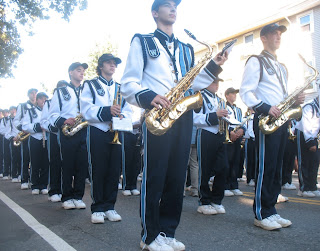
For the third time in my life I was on a jury, this trial lasting for parts of two days, and for the second time I was the jury foreman. This was a fairly simple case of domestic assault and our verdict was "not guilty." It seemed to be a family squabble that should never have reached the courthouse, but the other jurors and I deliberated thoughtfully and patiently to arrive at our decision.
I know that people generally try to avoid jury duty, but I've always enjoyed it. I like seeing the justice system from the inside, and I've been reassured by the seriousness and intelligence of those who've sat on juries with me -- and this time was no different. I've been called to serve four times, but only once did I not get on a case. On that occasion I knew the young victim, who was from East Boston, and had met the accused stepfather, so I had to remove myself from the jury pool.
I arrived at the courthouse in Roxbury (pictured above) yesterday at 8:30 a.m. and was pointed to a small room where 14 others sat quietly, some reading, others looking blankly forward. The room was quite warm, and one guy was sweating profusely. The court officer made a call to maintenance, but the heat was not on. He opened all the windows for some relief, and it was unseasonably nice outside.
One young woman who sat across a narrow aisle from me appeared to have walked off of the video shoot of Olivia Newton-John's 1981 hit "Let's Get Physical." She must have been 18 or so, and she wore black spandex, a white T-shirt, sneakers with neon pink socks, and a headband with her hair up. Was this a ploy to appear so unserious that she'd never be chosen for a jury, or did she really believe it was alright to decide the fate of another person looking like that?
There was a young man with a big beard, slouchy jeans and a T-shirt, tattoos on his arms and a ring through his nose. The prosecutor seemed to have him removed from the jury. I couldn't hear the bench discussion too well from across the room, but it appeared that he'd had some brush with the law fairly recently. Either that, or the fear was that the guy was just generally anti-authority and wouldn't believe the cop who was scheduled to testify.
The judge in the case was Kenneth Fiandaca, and right away the name rang a bell as familiar in East Boston. It turns out that he grew up here and was three years ahead of me at Savio High School, graduating in 1978, according to
this story in the Winthrop Transcript. Fiandaca did a fine job presiding at the brief trial, and he stopped by the jury room just before we left to thank us and answer questions. If I knew we were both sons of Eastie I would have mentioned it.
So my civic duty is done for a few years. I don't mind playing my part to ensure the rule of law in our system. Those of us, especially, who like to complain, disagree, actively dissent and argue against policies of our government have, I think, an obligation to participate in the levers of democracy, and voting and serving on a jury are two small ways to do so.












